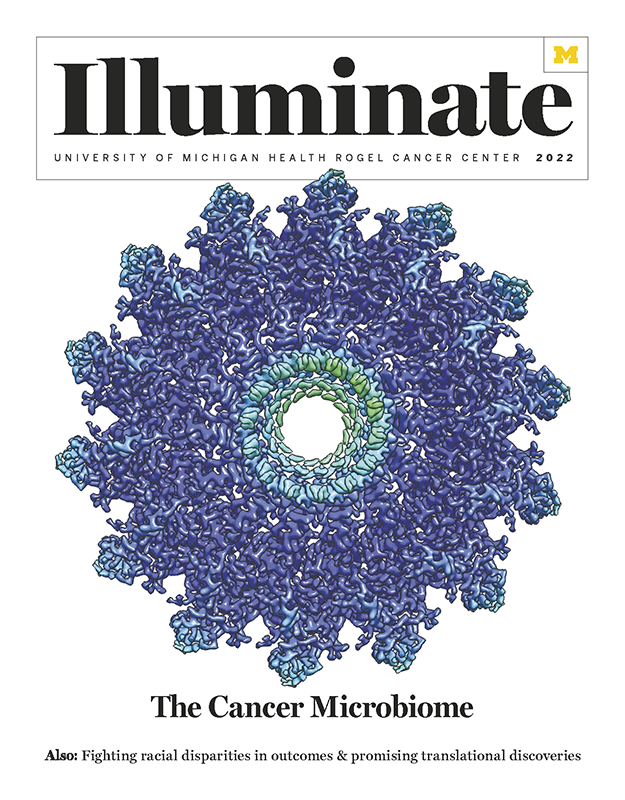Illuminate 2022

Scientists are just starting to appreciate the many ways microbes influence the initiation, progression and treatment of cancer. It's known that some microbiomes, like Helicobacter pylori’s triggers chronic inflammation that contributes to stomach cancer. It's also known that maintaining a a healthy gut microbiome nurtures our immune system so that our immune cells can fight against cancer. Learn how the Rogel Cancer Center research members are studying these microbiomes to better understand how to prevent and treat the development of gastrointestinal cancers.
As Eric Fearon, M.D., Ph.D., Rogel Cancer Center Director has said; "Basic science research is one of our most important missions — and our members are investigating important areas including the functions of the tumor microenvironment, key signaling changes in cancer cells and tumor stroma, and epigenetic mechanisms of cancer development. Yet its equally important for us to continue to seek opportunities to translate this new knowledge into effective strategies for prevention, early diagnosis and treatment. Read on to learn more about this aspect of research at Rogel.
Combating cancer disparities has been a longtime priority for Rogel Cancer Center, well before events like the Black Lives Matter movement and the COVID-19 pandemic broadened the public consciousness of society’s systemic inequities. But recently, Rogel created a new position: an associate director for diversity, equity, inclusion and justice. Equity work requires constant commitment, which leads to a level of consistency, in terms of approaches to patient care, research, teaching and community outreach. Read on to learn more.
Max Wicha, M.D., founding director of the Rogel Cancer Center, reflects on the progress of cancer treatment and research on the 50th anniversary of the National Cancer Act. From his perspective, this act changed the way doctors treated cancer and encouraged them to share information with researchers. By combining their efforts, better and more effective treatments were developed.
Dr. Aki Morikawa discusses Rogel’s IMPACT program -- Improve Metastatic Breast Cancer Patient Access to Coordinated Treatment. This is a collaboration of medical, surgical and radiation oncologists, and specialists in genetic testing and counseling, physical rehabilitation, neuropsychology and palliative care. It is single point of care coordination for patients with advanced disease.
Dr. Lori Pierce shares her views now the institutional racism is finally being recognized on race and societal plague that is devastating to all of us — and as physicians
and researchers, we must do more to confront the longstanding inequities that pervade oncology and all of medicine.
Zeribe Nwosu, Ph.D., a postdoctoral trainee in the labs of Costas Lyssiotis, Ph.D., and Marina Pasca Di Magliano, Ph.D., is focused on the intersection of metabolism, genomics and the immune system in pancreatic cancer.
Lindsay Kobayashi, Ph.D., an assistant professor in the University of Michigan School of Public, Health.is helping Rogel researchers answer big questions about cancer and aging.
